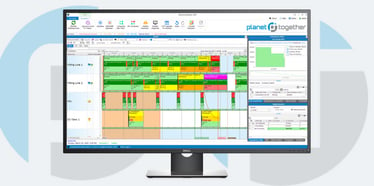Order Fulfillment Performance
Order fulfillment stands as the linchpin of success in industrial manufacturing. Meeting customer demands efficiently while maintaining quality standards is a perpetual challenge. In this era of Industry 4.0, where technology reigns supreme, the integration of advanced Manufacturing Execution Systems (MES), Enterprise Resource Planning (ERP), and Supply Chain Management (SCM) software has revolutionized how manufacturers approach order fulfillment performance monitoring.
In this blog, we look into the critical aspects of order fulfillment performance monitoring in industrial manufacturing, with a focus on the integration between PlanetTogether and leading ERP, SCM, and MES systems like SAP, Oracle, Microsoft, Kinaxis, Aveva, and others.

Understanding Order Fulfillment Performance Monitoring
Order fulfillment performance monitoring encompasses a spectrum of activities aimed at ensuring orders are processed, manufactured, and delivered to customers on time and in full. It involves tracking key metrics such as order cycle time, inventory levels, production efficiency, delivery accuracy, and customer satisfaction.
Efficient order fulfillment performance monitoring provides manufacturers with valuable insights into their operations, enabling them to identify bottlenecks, optimize processes, and make data-driven decisions to enhance overall efficiency and profitability.

The Role of Integrated Systems
In today's interconnected digital landscape, the seamless integration of MES, ERP, and SCM systems is paramount for achieving optimal order fulfillment performance. Let's explore how the integration between PlanetTogether and leading enterprise software solutions facilitates this process:
1. SAP Integration:
SAP, a global leader in ERP software, offers robust solutions for streamlining manufacturing operations. By integrating PlanetTogether with SAP ERP, manufacturers gain real-time visibility into production schedules, resource allocation, and inventory levels. This integration enables automated data exchange between systems, ensuring accurate demand forecasting, production planning, and order processing.
2. Oracle Integration:
Oracle's comprehensive suite of SCM and ERP applications provides manufacturers with end-to-end visibility and control over their supply chain and manufacturing processes. Integrating PlanetTogether with Oracle enables synchronized planning, scheduling, and execution across the entire production cycle. Manufacturers can leverage predictive analytics and machine learning algorithms to optimize production schedules, minimize lead times, and improve on-time delivery performance.
3. Microsoft Integration:
Microsoft Dynamics ERP offers manufacturing organizations a flexible and scalable platform for managing their operations. By integrating PlanetTogether with Microsoft Dynamics, manufacturers can synchronize production schedules with resource availability, material procurement, and customer demand. This integration facilitates collaborative planning and decision-making, enabling stakeholders to react swiftly to changes in market demand or production constraints.
4. Kinaxis Integration:
Kinaxis RapidResponse SCM platform empowers manufacturers with real-time supply chain visibility and agility. Integrating PlanetTogether with Kinaxis enables manufacturers to create an interconnected planning environment where production schedules, inventory levels, and customer orders are dynamically synchronized. This integration facilitates proactive risk management, scenario analysis, and rapid response to disruptions, ensuring continuity of operations and customer satisfaction.
5. Aveva Integration:
Aveva's MES solutions provide manufacturers with granular visibility and control over their production processes. By integrating PlanetTogether with Aveva MES, manufacturers can bridge the gap between planning and execution, ensuring seamless coordination between production schedules and shop floor activities. This integration enables real-time monitoring of equipment performance, quality metrics, and production KPIs, allowing manufacturers to identify and address issues before they escalate.
-Apr-01-2024-01-39-55-8668-PM.png?width=300&height=48&name=logo%20(2)-Apr-01-2024-01-39-55-8668-PM.png)

Key Benefits of Integration
The integration between PlanetTogether and leading ERP, SCM, and MES systems offers manufacturers a myriad of benefits, including:
Enhanced Visibility: Real-time synchronization of data enables stakeholders to monitor production progress, identify bottlenecks, and make informed decisions to optimize performance.
Improved Efficiency: Automated workflows streamline processes, reduce manual intervention, and minimize errors, leading to increased productivity and resource utilization.
Optimized Planning: Integrated planning capabilities enable manufacturers to align production schedules with customer demand, inventory levels, and resource capacity, resulting in better allocation of resources and reduced lead times.
Agile Responsiveness: Rapid response to changing market conditions, supply chain disruptions, or production constraints ensures continuity of operations and customer satisfaction.
Cost Savings: Elimination of redundant tasks, inventory stockouts, and production delays helps minimize operational costs and maximize profitability.

Best Practices for Implementation
To harness the full potential of integrated order fulfillment performance monitoring, manufacturers should consider the following best practices:
Define Clear Objectives: Clearly define the goals and objectives of the integration project, aligning them with the strategic priorities of the organization.
Engage Stakeholders: Involve key stakeholders from across the organization, including production, supply chain, IT, and finance, to ensure buy-in and collaboration throughout the implementation process.
Data Standardization: Establish data standards and protocols for seamless communication and data exchange between systems, ensuring consistency and accuracy of information.
Training and Support: Provide comprehensive training and ongoing support to users to familiarize them with the integrated systems and empower them to leverage its capabilities effectively.
Continuous Improvement: Monitor performance metrics, gather feedback, and iterate on processes to continuously optimize the integrated solution and drive continuous improvement.
Order fulfillment performance monitoring is a critical function for industrial manufacturing organizations seeking to meet customer demands efficiently and maintain a competitive edge in the market. By integrating PlanetTogether with leading ERP, SCM, and MES systems like SAP, Oracle, Microsoft, Kinaxis, Aveva, and others, manufacturers can unlock synergies, streamline operations, and achieve superior order fulfillment performance.
Embracing digital transformation and leveraging integrated systems empower manufacturers to navigate complexities, mitigate risks, and capitalize on opportunities in today's dynamic business environment. With a strategic approach to integration and a commitment to continuous improvement, manufacturers can optimize their order fulfillment processes, drive operational excellence, and deliver value to customers, stakeholders, and shareholders alike.
Are you ready to take your manufacturing operations to the next level? Contact us today to learn more about how PlanetTogether can help you achieve your goals and drive success in your industry.